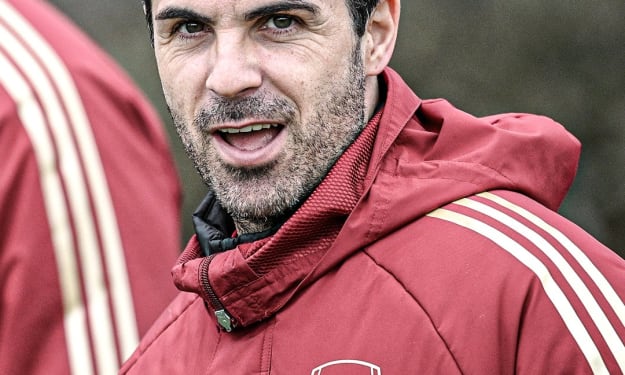
It's as satisfying to me as, uh, coming is, you know? As, ah, having sex with a woman and coming. And so can you believe how much I am in heaven? I am like, uh, getting the feeling of coming in a gym, I'm getting the feeling of coming at home, I'm getting the feeling of coming backstage when I pump up, when I pose in front of 5,000 people, I get the same feeling, so I am coming day and night. I mean, it's terrific. Right? So you know, I am in heaven.--Arnold Schwarzenegger
When I was in college, a professor introduced me to a book of cogent cultural essays (I can not now remember the title), one of which examined the various factors of mid-1980s narcissism, claiming it as the decade when people stopped being "whole individuals," and started to become "body parts"; in other words, they began brutally appraising each other at gyms and fitness centers based on how developed individualized parts of their anatomy looked; if they had "great arms, abs, delts," and so on. (Think Patrick Bateman.)
Pumping Iron, while not a product specifically of Eighties consumerism, does prefigure this particular brand of narcissistic self-absorption. The muscle-bound hunks that populate Gold's Gym in Venice Beach, California, the most famous of which would go on to become cultural icons--Arnold Schwarzenegger and Lou Ferrigno--indeed brutally appraise each other, are locked in competition to see who can become the most like unto Adonis or Hercules; a comic book hero of epic physical proportions. To that end, they, most specifically Shwarzenegger, seem to throw good sportsmanship to the wind, delighting in pranks that amount, at times, to psychological warfare.
In this, they seem as vain, as catty as glamorous starlets. Schwarzenegger, in particular, comes off as famously arrogant and cocky. But, Pumping Iron, while it exposes us to the nastier side of a group of competitive athletes, also gives us an important peek into the psychology of men who spend hundreds of hours sculpting a physique simply for the thrill f putting it on display, for the competitive gamble of traveling halfway around the world to walk across a stage, flex, pose; be a god for an hour.
Just listening to them we understand that many of them grew up bullied, picked-on; vulnerable. One bodybuilder, Ken Waller, confesses how he was painfully skinny and nerdy before discovering a picture of Shwarzenegger in a magazine. After that, after eating and putting on weight and beginning to train, he became a pro bodybuilder, entering competitions. The viewer can well imagine the abuse he must have suffered beforehand, the teasing, and what effect this must have had on his psyche, to push him in this direction.
Of course, if Waller suffered abuse, he also seems here eager to meet some of it back out, as we see in his famous competitive "pranking" of fellow bodybuilder Mike Katz. Katz, who comes off as the most endearing, knows that he always gets the most applause because, whether he wins the competition or not, "the crowd is out there for me."
Waller sees it differently, telling a group of fellow athletes, "Mike's....calves are too big for his legs. He looks "like a big ol' spider." Thus, he isn't "worried" about competing against Katz. However, he confesses he's planning on "hiding his shirt" when they get to the contest as a way to undermine him mentally.
None of the other men he's talking to see this as bad sportsmanship. Instead, they seem rather amused at the small, strategical cruelty.
Katz, by contrast, is revealed as affable and seemingly the most humane of any of these guys. Giving a similar confession of being bullied growing up, partly due to the anti-Semitic jibes of classmates, Katz started out bulking up by playing pro football, then discovered bodybuilding. He is presented as a good-natured, if naive family man, playing on the front lawn of a suburban home with his children.
Waller indeed hides Mike's special shirt at the competition. Waller wins. Mike Katz, far from being angry that his opponent has just walked away with the prize, observes, "Can you imagine how this must feel for him?" He goes to congratulate Waller.
The central conflict of the film, of course, is the rivalry between Arnold Schwarzenegger and Lou Ferrigno. Schwarzenegger, obviously, would go on to be one of the biggest box office draws of the ensuing decades, then become Governor of California. Ferrigno would achieve fame in a more limited fashion, as the rampaging green ogre of the 1980s television comic book show "The Incredible Hulk." Both men's backgrounds--Schwarzenegger hailing from an ultraconservative, privileged Austrian home, Ferrigno from a working-class background in Brooklyn--no doubt formulated who they later became. Schwarzenegger seems to have grown up in the shadow of his policeman father. Like Schwarzenegger, Ferrigno grew up in the shadow of HIS policeman father, Matty Ferrigno, who retired from the NYPD to oversee his son's training and bodybuilding competitions.
Matty Ferrigno is a tough, non-nonsense stage father, forever dispensing advice to his guileless son, who grew up partially deaf and has a noticeable speech impediment. Telling him at one point, "Never feel sorry for yourself!" the duo are ensconced in a dark little dungeon of a gym, making their way through Ferrigno's grueling workouts with plenty of hard-nosed encouragement and tough love.
A fiercely proud man, Matty Ferrigno is exultant in the glow of his son's success, saying in effect, "You want to tell the audience, 'that's my son'. Give him one more round of applause..." A film focused solely on the relationship between these two would have made an equally wonderful documentary.

Arnold, by contrast, is living the life of a rock star, making appearances at prisons, posing with drooling admirers, getting photographed with beach bunny models for magazine spreads; generally prefiguring the astronomical success that would come to him later. Unlike him, his training partner, the late Franco Columbo, goes home to native Sardinia to eat a meal with his family, who still observe the old world ways. (While there, he manages feats of strength such as lifting the back end of an automobile. Schwarzenegger once confessed that Columbu was the strongest man he had ever in his life encountered.)
Training buddy or not (and the film opens with Columbu and Shwarzenegger practicing poses with a ballet instructor), Arnold says of his pal:
"Franco is pretty smart, but Franco's a child, and when it comes to the day of the contest, I am his father. He comes to me for advices. So it's not that hard for me to give him the wrong advices."
Schwarzenegger goes on to say of a prospective opponent in the Mr. Olympia competition that, the night before, in the hotel room, he will "mess him up"; i.e., he'll inflict such mental damage on the poor, unsuspecting young man that it will cause him to place badly in the competition. Arnold is seen wearing a shirt that says, "Arnold is Numero Uno." This isn't meant to be humorous or ironic, the viewer realizes. This is Arnold's actual philosophy, what would go on to propel him to career heights he could only then have dreamed of. He confesses that he has to "cut himself off" from the petty concerns of life, that he cannot allow a woman to interfere with his single-minded fanatical purpose of being the "Champion." His life is a testament to what one man with a dedicated vision can manage to achieve.
Ferrigno, the former Brooklyn sheet metal worker, journeys with his fellow athletes to Pretoria, where at 6' 2, 270 pounds, he is the single biggest bodybuilder there. Arnold psyches him out, subtly insulting him, and doing the same to training partner Columbu. Lo and behold, Arnold wins the competition, the guileless Ferrigno placing third behind Schwarzenegger and Columbu. Schwarzenegger, who has won the competition FIVE YEARS ina row, announces his retirement from competition.
Later, the athletes party, and Arnold eats bad fried food, cake and, amazingly, the future governor of California SMOKES A JOINT ON CAMERA.
The film ends with Schwarzenegger and the Ferrignos driving away on a bus, smiling, all rivalries and underhanded, mean-spirited, dirty tricks seemingly forgotten. Perhaps the brutal struggle and competition among these guys was all some sort of act?
No.
Pumping Iron can be viewed free with adds at YouTube.
About the Creator
Tom Baker
Author of Haunted Indianapolis, Indiana Ghost Folklore, Midwest Maniacs, Midwest UFOs and Beyond, Scary Urban Legends, 50 Famous Fables and Folk Tales, and Notorious Crimes of the Upper Midwest.: http://tombakerbooks.weebly.com






Comments
There are no comments for this story
Be the first to respond and start the conversation.